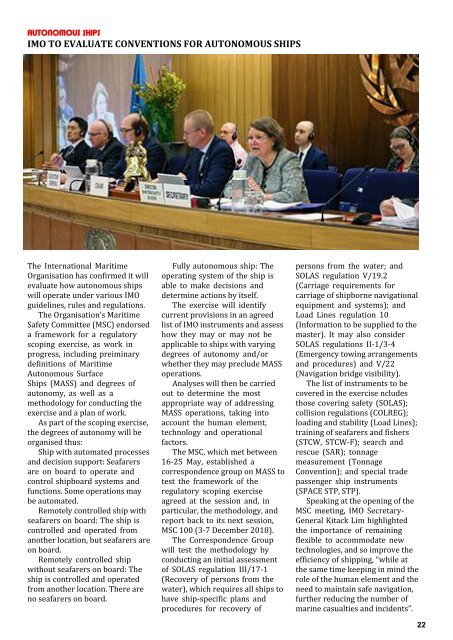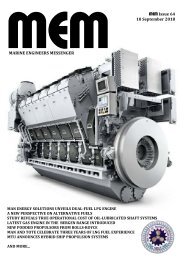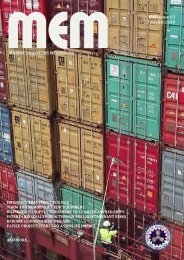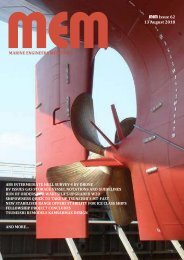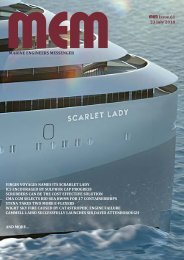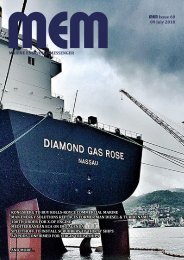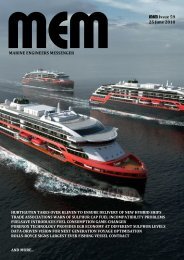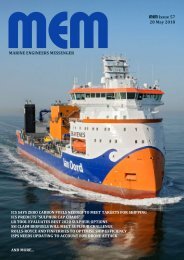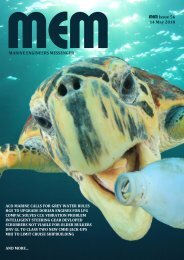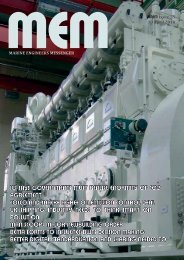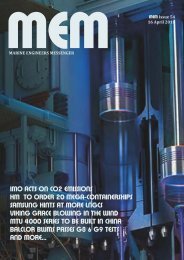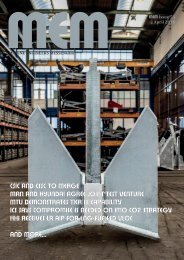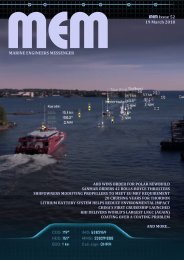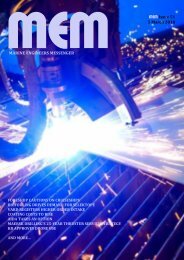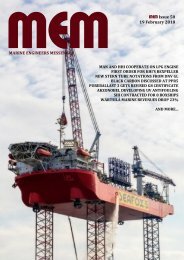MEM58
Marine Engineers Messenger, Volume 3, Issue 58
Marine Engineers Messenger, Volume 3, Issue 58
- No tags were found...
You also want an ePaper? Increase the reach of your titles
YUMPU automatically turns print PDFs into web optimized ePapers that Google loves.
AUTONOMOUS SHIPS<br />
IMO TO EVALUATE CONVENTIONS FOR AUTONOMOUS SHIPS<br />
The International Maritime<br />
Organisation has confirmed it will<br />
evaluate how autonomous ships<br />
will operate under various IMO<br />
guidelines, rules and regulations.<br />
The Organisation’s Maritime<br />
Safety Committee (MSC) endorsed<br />
a framework for a regulatory<br />
scoping exercise, as work in<br />
progress, including preiminary<br />
definitions of Maritime<br />
Autonomous Surface<br />
Ships (MASS) and degrees of<br />
autonomy, as well as a<br />
methodology for conducting the<br />
exercise and a plan of work.<br />
As part of the scoping exercise,<br />
the degrees of autonomy will be<br />
organised thus:<br />
Ship with automated processes<br />
and decision support: Seafarers<br />
are on board to operate and<br />
control shipboard systems and<br />
functions. Some operations may<br />
be automated.<br />
Remotely controlled ship with<br />
seafarers on board: The ship is<br />
controlled and operated from<br />
another location, but seafarers are<br />
on board.<br />
Remotely controlled ship<br />
without seafarers on board: The<br />
ship is controlled and operated<br />
from another location. There are<br />
no seafarers on board.<br />
Fully autonomous ship: The<br />
operating system of the ship is<br />
able to make decisions and<br />
determine actions by itself.<br />
The exercise will identify<br />
current provisions in an agreed<br />
list of IMO instruments and assess<br />
how they may or may not be<br />
applicable to ships with varying<br />
degrees of autonomy and/or<br />
whether they may preclude MASS<br />
operations.<br />
Analyses will then be carried<br />
out to determine the most<br />
appropriate way of addressing<br />
MASS operations, taking into<br />
account the human element,<br />
technology and operational<br />
factors.<br />
The MSC, which met between<br />
16-25 May, established a<br />
correspondence group on MASS to<br />
test the framework of the<br />
regulatory scoping exercise<br />
agreed at the session and, in<br />
particular, the methodology, and<br />
report back to its next session,<br />
MSC 100 (3-7 December 2018).<br />
The Correspondence Group<br />
will test the methodology by<br />
conducting an initial assessment<br />
of SOLAS regulation III/17-1<br />
(Recovery of persons from the<br />
water), which requires all ships to<br />
have ship-specific plans and<br />
procedures for recovery of<br />
persons from the water; and<br />
SOLAS regulation V/19.2<br />
(Carriage requirements for<br />
carriage of shipborne navigational<br />
equipment and systems); and<br />
Load Lines regulation 10<br />
(Information to be supplied to the<br />
master). It may also consider<br />
SOLAS regulations II-1/3-4<br />
(Emergency towing arrangements<br />
and procedures) and V/22<br />
(Navigation bridge visibility).<br />
The list of instruments to be<br />
covered in the exercise ncludes<br />
those covering safety (SOLAS);<br />
collision regulations (COLREG);<br />
loading and stability (Load Lines);<br />
training of seafarers and fishers<br />
(STCW, STCW-F); search and<br />
rescue (SAR); tonnage<br />
measurement (Tonnage<br />
Convention); and special trade<br />
passenger ship instruments<br />
(SPACE STP, STP).<br />
Speaking at the opening of the<br />
MSC meeting, IMO Secretary-<br />
General Kitack Lim highlighted<br />
the importance of remaining<br />
flexible to accommodate new<br />
technologies, and so improve the<br />
efficiency of shipping, “while at<br />
the same time keeping in mind the<br />
role of the human element and the<br />
need to maintain safe navigation,<br />
further reducing the number of<br />
marine casualties and incidents”.<br />
22


